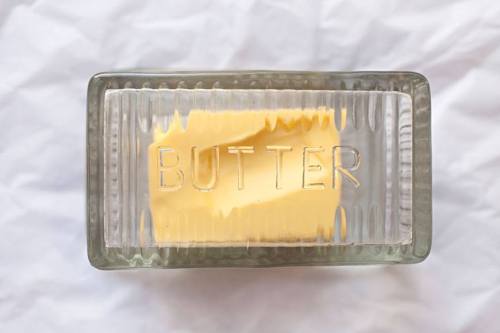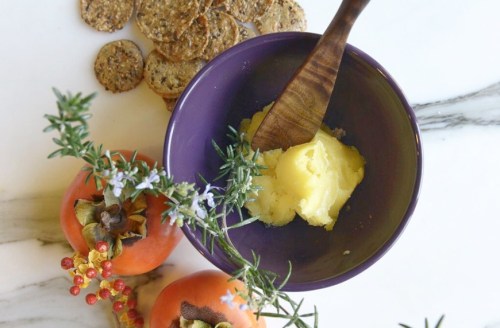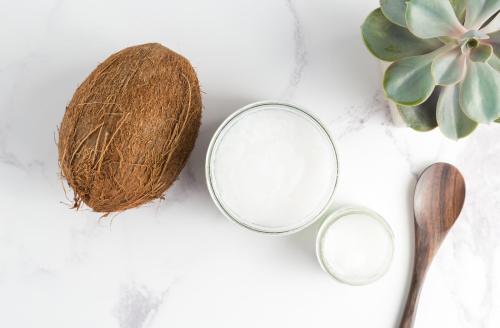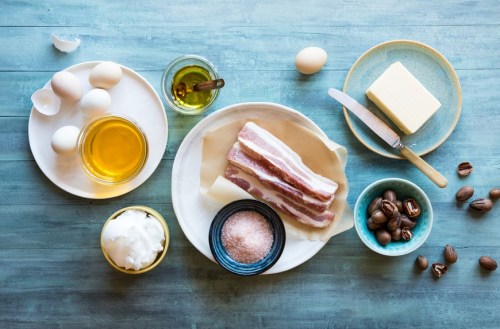We’re officially in a golden age of healthy fats—one in which butters, in particular, have shed their heart-attack-promoting image to be embraced by the wellness crowd. New research is touting the benefits of the grass-fed variety, which has propelled the Bulletproof craze and is now a staple of the keto diet. At the same time, ghee—clarified butter that’s been used medicinally for thousands of years in Ayurvedic cooking—is also finding favor in the western world. And then there’s coconut oil, a dairy-free butter substitute whose benefits go way beyond the kitchen. (Although there’s been some confusion lately about how healthy this all-star really is.)
But with so many choices on offer, it can be difficult to figure out whether any of these good-for-you fats is superior to the rest. To make your grocery-aisle decision a little easier, I asked experts to break down the health benefits of each. Armed with their wisdom, you’ll be able to choose the one that best meets your dietary and lifestyle needs—whether you’re putting a dollop in your coffee, using it to sautée veggies, or slathering it on a hunk of gluten-free banana bread. (Um, is it lunchtime yet?)
Grass-fed butter vs. ghee vs. coconut oil: Here’s how these healthy fats compare to one another.

The case for eating grass-fed butter
Until recently, butter had a pretty unhealthy reputation. But its comeback started when Bulletproof coffee was born—you know, the buzzy drink that’s traditionally blended with butter from grass-fed cows. (Bulletproof founder Dave Asprey claims that grass-fed butter is cleaner and more nutrient-dense than butter from factory-farmed cows.)
According to Nicole Glassman, holistic nutritionist at Mindful Health, grass-fed butter earns high marks because it’s rich in conjugated linoleic acid (CLA), which may help us combat oxidative stress and promote fat loss. Although CLA can also be found in ghee, grass-fed butter has more of it, adds Nutritious Life founder Keri Glassman, MS, RD, CDN.

When ghee might be your best choice
Nutritionally, ghee is the best option, says Nicole Glassman. Why? “Ghee has more short- and medium-chain fatty acids [MCTs] than traditional butter,” she says. “These are fats that can be quickly utilized by the body, and they’re less likely to be stored as fat.”
Ghee, which has been boiled and strained to remove water and milk solids, is also rich in vitamins D, K, and A in a way that grass-fed butter and coconut oil aren’t. Nicole Glassman says that this combination of healthy fats, vitamins, and omega-3s is believed to improve digestion and fight inflammation, and it’s useful when your vitamin levels are depleted—especially if you’re low in vitamin D, as many of us are.
Plus, there’s another benefit to choosing ghee over butter: Many people who are lactose intolerant are able to digest ghee, since it the lactose is mostly removed from the product through the clarifying process. That said, it’s still sourced from cows, which immediately disqualifies this option from a vegan diet.
And despite its nutritious properties, ghee isn’t exactly a “health food,” Keri Glassman points out. “It’s still a form of butter, and butter is a ‘use-in-proper-portion’ kind of fat.” Indeed, while the conversation around fat has shifted, she warns that too much can still sabotage your health goals.

Is coconut oil *really* good for you?
Among the healthy fat trio being examined here, coconut oil’s the only one that’s suitable for vegans. And although it lacks the nutrient density of ghee, it does have a slew of health benefits.
According to Keri Glassman, coconut oil’s lauric and caprylic acid content give it antibacterial properties, which can be helpful for preventing breakouts and fighting off infection.
Additionally, coconut oil is high in saturated fats. If you’re thinking, Wait, isn’t that a bad thing?, you’re almost correct. As Keri Glassman explains, “saturated fat used to be demonized for raising heart disease risk, but recent research has changed that thinking. The saturated fat in coconut oil has actually been found to raise your good (HDL) cholesterol and lower triglycerides, the fats in your blood that raise heart disease risk.”
You may want to exercise caution when consuming this superfood, however. The American Heart Association and some experts are skeptical of its role in improving cardiovascular health, and they point out that many people are eating it in sky-high quantities.
So what’s the verdict? Ultimately, both experts say that there’s no clear winner in the healthy fat debate, and that it all comes down to a combination of individual preference and moderation. Because like all things in wellness—even kale!—you definitely can have too much of a good thing.
Another type of butter we can’t get enough of? The kind made from almonds. Get your fix with this almond butter-banana cheesecake, and make sure you’re getting every last drop out of the jar with this genius hack.
Sign Up for Our Daily Newsletter
Get all the latest in wellness, trends, food, fitness, beauty, and more delivered right to your inbox.
Got it, you've been added to our email list.











